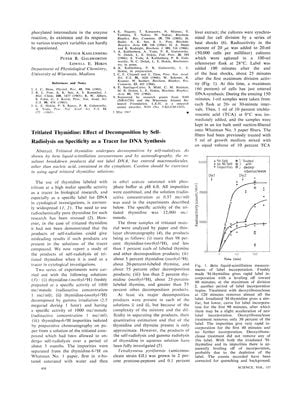Tritiated Thymidine: Effect of Decomposition by Self-Radiolysis on Specificity as a Tracer for DNA Synthesis
July 1967
in “
Science
”

TLDR Decomposed tritiated thymidine is less accurate for DNA tracing, and hair changes can indicate malnutrition.
The document detailed a study on the effects of self-radiolysis on tritiated thymidine, a tracer for DNA synthesis. It was found that decomposed tritiated thymidine produces byproducts that incorporate into cytoplasmic macromolecules rather than DNA, which could lead to inaccurate results in tracer experiments. The study emphasized the necessity of using fresh tritiated thymidine and performing digestion controls for precise outcomes. Additionally, the document described a separate study involving eight male subjects aged 24 to 29 who underwent a 15-day period of protein deprivation. The study observed morphological changes in the hair bulb and external root sheath of the subjects' hair, indicating potential as a diagnostic tool for protein-calorie malnutrition, although there was no change in the anagen to telogen phase ratio of hair growth.


